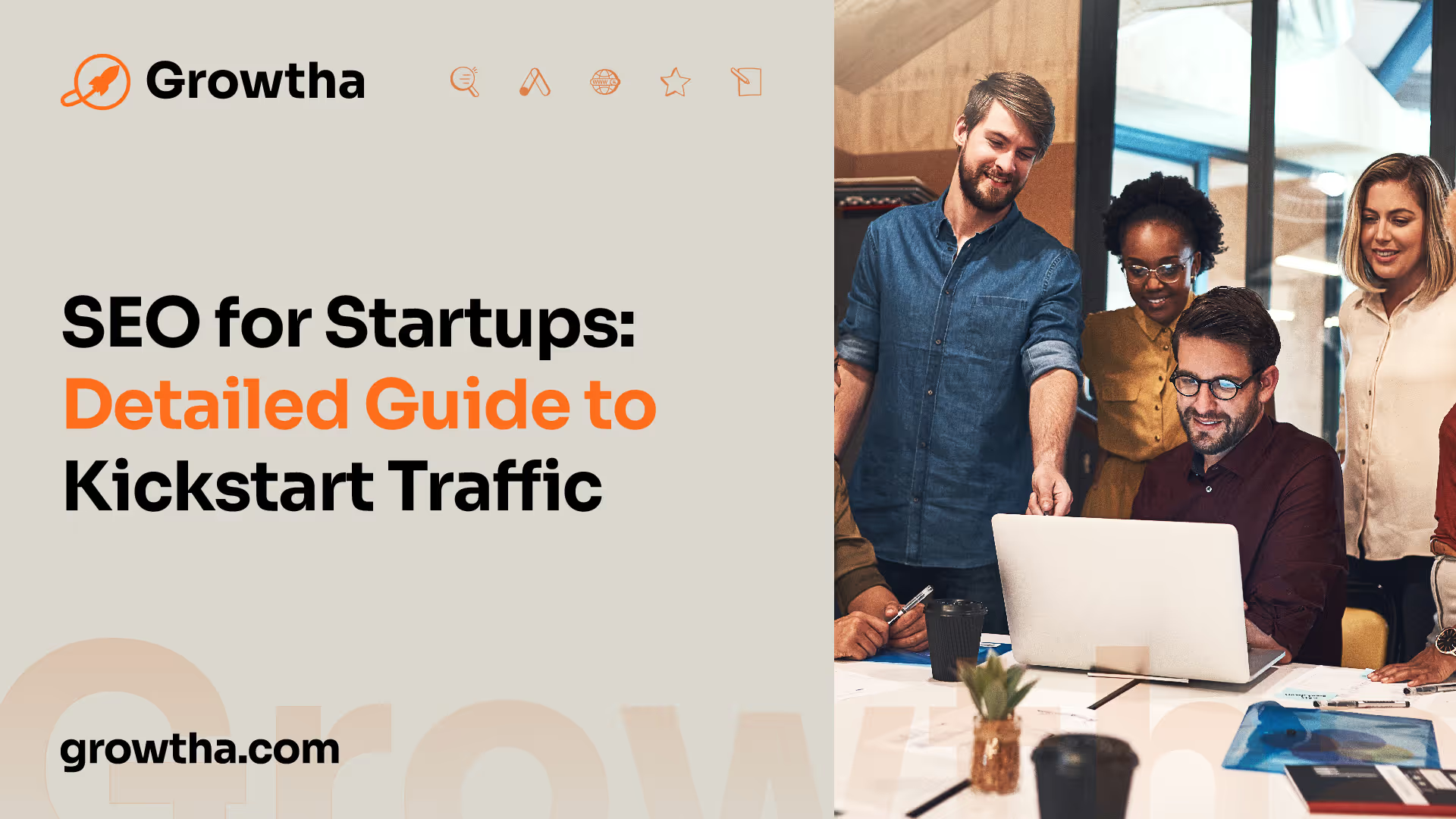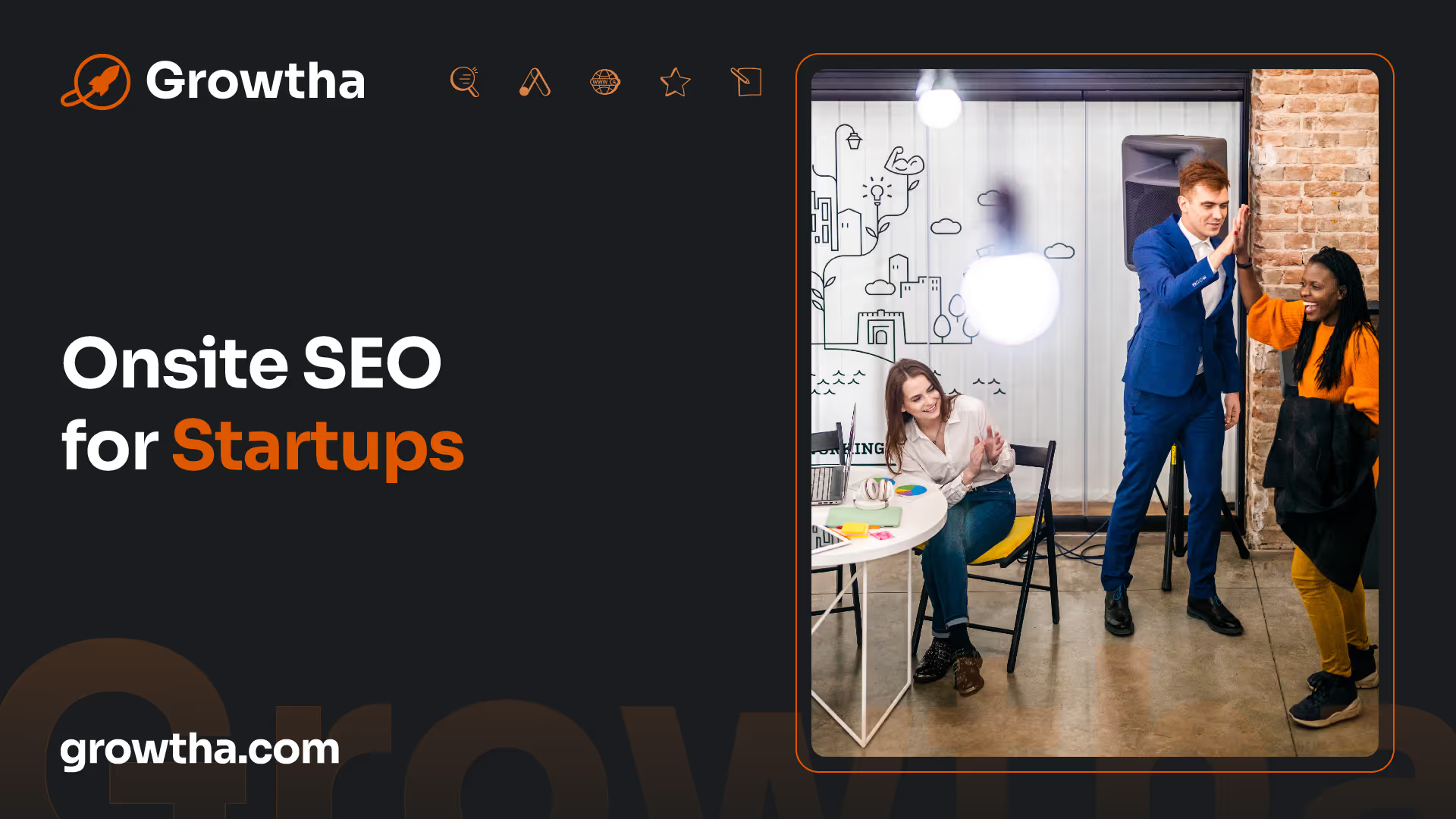SEO for Startups: Detailed Guide to Kickstart Traffic
SEO for startups involves optimizing a new business's online presence to increase visibility in search engines, drive organic traffic, and foster growth.


SEO for Startups: Detailed Guide to Kickstart Traffic
Importance of SEO for Startups
In the digital age, SEO has become a crucial component of any startup's marketing strategy. SEO for startups involves optimizing a new business's online presence to increase visibility in search engines, drive organic traffic, and foster growth. It offers startups a competitive edge and is a cost-effective way to launch a new business.
SEO for New Businesses
For startups, establishing an online presence is essential to attract potential customers. However, simply having a website or online platform is not enough. SEO ensures that a startup's offerings are easily discoverable by its target audience. By implementing SEO best practices, startups can improve their search engine rankings, making it more likely for their website or content to appear in relevant search results [1].
Benefits of SEO for Startups
The benefits of SEO for startups are numerous. Here are some key advantages:
- Increased Visibility: SEO helps startups rank higher in search engine results pages (SERPs), making it more likely for their target audience to find them. By optimizing their online presence, startups can increase their visibility and gain exposure to potential customers [1].
- Organic Traffic: As startups climb the search engine rankings, they can attract more organic traffic to their website or online platform. Organic traffic refers to visitors who find a website through unpaid, natural search results. By driving organic traffic, startups can reach a wider audience without relying heavily on paid advertising.
- Cost-Effectiveness: SEO is a cost-effective marketing strategy for startups. Compared to traditional advertising methods, such as print or television ads, SEO offers a higher return on investment. By investing in SEO, startups can achieve long-term benefits and sustainable growth without breaking the bank [1].
- Competitive Edge: In a competitive market, startups need to stand out. SEO provides a competitive edge by helping startups differentiate themselves from their competitors. By optimizing their online presence, startups can showcase their unique value propositions and attract customers who are actively searching for their products or services.
In summary, incorporating SEO into a startup's marketing strategy is crucial for driving traffic, increasing visibility, and boosting revenue. By investing in SEO, startups can position themselves for success in the digital landscape and maximize their growth potential.

Onsite SEO for Startups
To kickstart traffic and improve visibility in search engines, startups need to focus on onsite SEO. Onsite SEO, also known as on-page SEO, involves optimizing a website's content and HTML source code to enhance its visibility in search engine results. By aligning various page elements with user queries, onsite SEO ensures that your website is more likely to appear in relevant search results, connecting your business with the right audience.
Understanding Onsite SEO
Onsite SEO plays a crucial role in optimizing your webpage's core elements to improve visibility and attract organic traffic. It involves optimizing content quality, keyword usage, meta tags, URL structure, internal links, and other on-page elements. By implementing effective onsite SEO strategies, you can enhance your website's ranking potential and increase its chances of being discovered by search engine users.
Elements of Onsite Optimization
Successful onsite optimization encompasses several key elements that contribute to a well-optimized website. These elements work together to improve your website's search engine visibility and overall user experience. Here are some essential aspects of onsite optimization:
1. Content Quality
Creating high-quality, informative, and engaging content is crucial for onsite SEO. Your content should align with your target audience's search intent and provide valuable information that satisfies their needs. Incorporating relevant keywords naturally within your content can help search engines understand the context and relevance of your webpages.
2. Keyword Usage
Strategic keyword usage is essential for onsite SEO. Conduct thorough keyword research to identify relevant keywords and phrases that your target audience is likely to use when searching for products or services similar to yours. Incorporate these keywords into your content, headings, meta tags, and URLs to signal to search engines the relevance of your website to specific queries.
3. Meta Tags
Optimizing meta tags, including title tags and meta descriptions, is crucial for onsite SEO. Your title tag should accurately describe the content of the webpage and contain relevant keywords. Meta descriptions provide a concise summary of the webpage's content and should entice users to click through from search engine results.
4. URL Structure
Creating SEO-friendly URLs is important for both search engines and users. Use descriptive, concise, and keyword-rich URLs that accurately reflect the content of the webpage. A well-structured URL can improve the visibility and click-through rate of your webpages in search results.
5. Internal Links
Internal linking refers to linking relevant pages within your website. It helps search engines understand the structure and hierarchy of your website, while also improving user navigation. By strategically linking related pages, you can distribute link equity and drive traffic to important webpages.
6. Page Speed
Optimizing your website's loading speed is crucial for both onsite SEO and user experience. A slow-loading website can negatively impact your search engine rankings and deter users from exploring your website. Ensure that your website is optimized for speed by compressing images, minifying code, and utilizing caching techniques.
By focusing on these elements of onsite optimization, startups can lay a solid foundation for improving their website's visibility in search engine results. Implementing effective onsite SEO strategies will help attract organic traffic, increase brand awareness, and ultimately contribute to the growth and success of your startup.

Off-Page SEO Strategies
In the realm of search engine optimization (SEO), off-page strategies play a crucial role in boosting a startup's online visibility and driving traffic to their website. One of the key components of off-page SEO is link building. By acquiring high-quality backlinks from reputable sources, startups can establish authority, increase their organic rankings, and attract potential customers and investors.
Link Building for Startups
Link building, often considered the backbone of SEO, emerges as a powerful tool for startups striving to make their mark in the tech industry [3]. It involves acquiring links from external websites that point back to your startup's website. These links act as digital votes of confidence, signaling to search engines and users alike that your startup is a credible player in the tech arena.
The benefits of link building for startups are manifold. Firstly, it enhances visibility among potential customers, establishing your startup as a trusted and authoritative source of information. This increased visibility can also attract the attention of investors looking for promising ventures [3]. Moreover, link building helps to improve organic search rankings, allowing your startup to compete more effectively in the crowded digital landscape.
To kickstart link building for your startup, it is crucial to focus on creating compelling content that resonates with your target audience. By developing valuable and relevant content, you can encourage organic sharing and attract natural backlinks. This lays the foundation for a robust link profile, enhancing your startup's credibility and authority.
Ethical Link-Building Practices
When it comes to link building, startups must adhere to ethical practices to maintain the integrity of their SEO efforts. Unethical tactics, such as buying links or participating in link schemes, can lead to severe penalties from search engines and tarnish your startup's reputation.
Instead, startups should focus on building genuine relationships with industry influencers and website owners. By creating valuable and relevant content, you can establish yourself as a thought leader and engage with influential individuals who may be interested in linking to your startup's website. This approach fosters organic link acquisition and ensures that your backlinks come from reputable sources [4].
It's important to note that link building is a continuous process. As your startup grows and evolves, it's crucial to consistently seek opportunities for acquiring high-quality backlinks. This can be done through content outreach, guest blogging, participating in industry forums, and leveraging social media platforms.
By implementing ethical link-building practices and focusing on creating compelling content, startups can harness the power of off-page SEO to enhance their online presence, attract targeted traffic, and establish themselves as credible players in the competitive tech industry.
Technical SEO Essentials
To achieve optimal visibility and rankings in search engine results, startups must prioritize technical SEO. This aspect of SEO focuses on optimizing the technical elements of a website to improve its crawlability and visibility. In this section, we will explore the basics of technical optimization and the importance of site speed.
Technical Optimization Basics
Technical SEO involves various elements that ensure search engines can easily access and understand a website's content. By optimizing these technical aspects, startups can enhance their website's visibility and improve its chances of ranking well in search results.
Some key aspects of technical optimization include:
- Site Structure: Creating a logical and organized site structure helps search engine crawlers navigate the website efficiently. A well-structured site with clear hierarchies makes it easier for search engines to understand the content and index it appropriately.
- URL Structure: Utilizing descriptive and user-friendly URLs not only helps visitors but also assists search engines in understanding the context of a page. Including relevant keywords in URLs can contribute to better rankings.
- XML Sitemaps: XML sitemaps provide search engines with a roadmap of a website's pages, helping them discover and index content more effectively. Including an XML sitemap improves the visibility of a website's pages in search results.
- Robots.txt File: The robots.txt file instructs search engine crawlers on which parts of a website to crawl and which parts to exclude. Properly configuring the robots.txt file ensures that search engines focus on indexing only the essential pages.
By addressing these technical elements, startups can lay a strong foundation for their website's search engine optimization.
Importance of Site Speed
Site speed is a critical factor in SEO. Faster-loading websites provide a better user experience and are favored by search engines. In fact, Google considers site speed as a ranking factor, meaning that faster websites have a higher chance of ranking well in search results.
Optimizing site speed involves implementing various techniques to reduce page load times and enhance user experience. Some essential optimizations include:
- Image Compression: Compressing images reduces their file sizes without significantly impacting their quality. This optimization technique reduces the overall page size and improves load times.
- Minification: Minifying CSS and JavaScript files involves removing unnecessary characters like whitespace and comments. This process reduces file sizes, allowing them to be transmitted and loaded faster.
- Browser Caching: Leveraging browser caching enables the temporary storage of website data on a user's device. By setting appropriate cache headers, browsers can store and retrieve certain elements from the cache, reducing the need to download them again.
- Content Delivery Networks (CDNs): CDNs distribute website content across multiple servers worldwide, allowing users to access the data from a server closer to their location. This reduces latency and improves site speed for users across different geographic locations.
By implementing these site speed optimizations, startups can enhance their SEO performance and provide a seamless user experience.
In conclusion, technical SEO is crucial for startups aiming to improve their website's visibility and rankings. By optimizing the technical elements of their website and prioritizing site speed, startups can lay the foundation for effective SEO and enhance user experience.
Local and International SEO
For startups, implementing an effective SEO strategy is essential to gain visibility and attract the right audience. Two important aspects of SEO that startups should consider are local SEO and international SEO.
Local SEO for Startups
Local SEO is a powerful tool for small businesses to compete in the search engine results pages (SERPs) and connect with their target audience in specific geographic areas. By optimizing your website for local SEO and creating a content strategy that addresses local issues, you can increase visibility and interaction with potential customers in your local market.
To implement local SEO for your startup, consider the following strategies:
- Optimize website content: Incorporate location-specific keywords throughout your website content to improve your chances of appearing in local search results.
- Create local business listings: Claim and optimize your business listings on platforms like Google My Business, Bing Places for Business, and Yelp. This will help your startup gain visibility in local directories.
- Manage online reviews: Encourage customers to leave positive reviews on platforms like Google, Yelp, and industry-specific review sites. Respond to reviews, both positive and negative, to show that you value customer feedback.
- Target location-specific keywords: Research and incorporate keywords that are relevant to your local market into your website content. This will help search engines understand your local relevance and improve your rankings.
Expanding Reach with International SEO
As your startup grows, you may want to expand your reach beyond local markets and target customers in different countries. International SEO allows startups to optimize their website content for multiple languages and target international audiences.
Consider the following strategies for international SEO:
- Optimize website content for multiple languages: Translate and localize your website content to cater to your target audience in different countries. This includes translating page titles, meta descriptions, and other important on-page elements.
- Implement hreflang tags: Use hreflang tags to indicate to search engines the language and regional targeting of your website pages. This helps search engines understand which version of your content to show to users in different countries.
- Conduct international keyword research: Research and target keywords that are specific to each target country or region. Consider cultural nuances and preferences when selecting keywords to ensure they resonate with your international audience.
- Build international backlinks: Develop a strategy to acquire backlinks from reputable websites in your target countries or regions. This can help improve your website's authority and visibility in international search results.
By implementing local and international SEO strategies, startups can enhance their online presence, attract local customers, and expand their reach to international markets. However, it's important to continually evaluate and adapt your SEO strategy to stay ahead of the competition and meet the evolving needs of your target audience.
Content Marketing and PPC for Startups
When it comes to driving traffic to your startup's website, content marketing and pay-per-click (PPC) advertising are two powerful strategies that can help you gain visibility and attract potential customers. Let's explore how to develop an effective content strategy for SEO and leverage PPC for increased visibility.
Content Strategy for SEO
Content marketing plays a crucial role in optimizing your site to rank high in search engine results, particularly in Google searches. It involves creating valuable and informative content that resonates with your target market and encourages them to share it with others [6].
To develop a content strategy that aligns with SEO best practices, consider the following:
- Keyword Research: Conduct keyword research to identify relevant terms and topics that your audience is searching for. This will help you create content centered around these keywords and increase the likelihood of ranking higher in search results.
- Long-Form Content: Writing long-form content, especially when you're initially trying to rank high, is more effective than content that is shorter in length. Google's algorithms prioritize high-quality, comprehensive content that provides in-depth information on a given topic.
- Relevance and Value: Focus on creating content that is relevant to your target audience's needs and interests. The more helpful and valuable your content, the more likely it is to be shared and linked to by others, which can positively impact your search engine rankings.
- Inbound Methodology: Adopt an inbound methodology that centers your content around what people want to discover, rather than solely promoting what you want to tell them [7]. By understanding your audience's pain points and providing solutions through your content, you can attract and engage potential customers.
By implementing a well-rounded content strategy that incorporates these elements, you can improve your startup's visibility in search engine results and attract a larger audience.
Leveraging PPC for Visibility
In addition to content marketing, PPC advertising can be a valuable tool to amplify your startup's online visibility. PPC allows you to display ads on search engines and other platforms, and you only pay when someone clicks on your ad.
Here are a few key considerations when leveraging PPC for increased visibility:
- Keyword Targeting: Conduct thorough keyword research to identify relevant keywords that align with your startup's products or services. Use these keywords to optimize your PPC campaigns and ensure your ads are shown to a highly targeted audience.
- Ad Copy and Design: Craft compelling ad copy that captures the attention of your target audience and entices them to click on your ad. Additionally, design visually appealing ads that align with your brand identity.
- Targeting Options: Take advantage of targeting options provided by PPC platforms to narrow down your audience based on demographics, location, interests, and more. This helps you reach the right people at the right time.
- Budget and Optimization: Set a budget for your PPC campaigns and regularly monitor their performance. Analyze key metrics such as click-through rates (CTR) and conversion rates to optimize your campaigns and ensure you're getting the most out of your advertising spend.
By combining a well-executed content strategy with strategic PPC campaigns, your startup can effectively increase its online visibility, attract targeted traffic, and ultimately drive growth.
References
[1]: https://www.gravitatedesign.com/blog/seo-for-startups/
[2]: https://www.gravitatedesign.com/blog/onsite-seo-for-startups/
[3]: https://www.linkedin.com/pulse/link-building-tech-startups-strategies-innovation-md-ponir-hossain-z5pfc
[4]: https://linkdoctor.io/link-building-for-tech-startups/
[5]: https://www.semrush.com/blog/seo-best-practices/
[6]: https://marketinginsidergroup.com/content-marketing/content-marketing-seo-ranking/
[7]: https://blog.hubspot.com/marketing/how-to-do-keyword-research-ht







